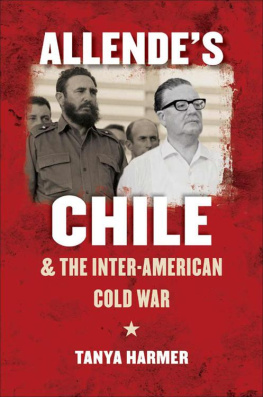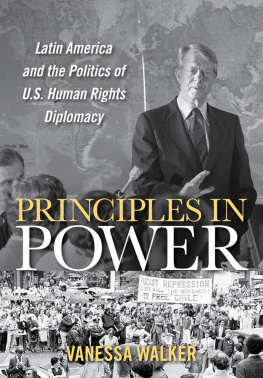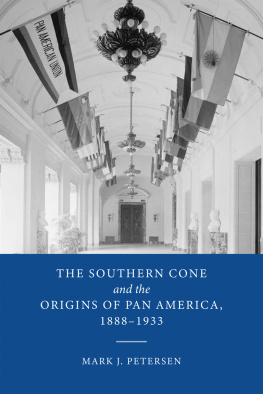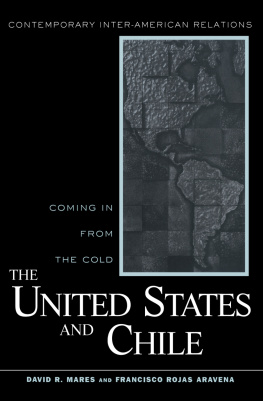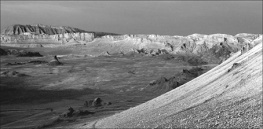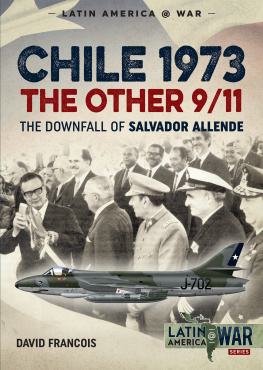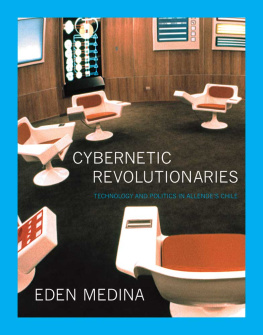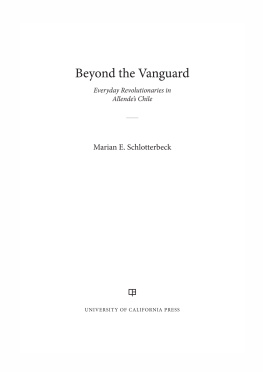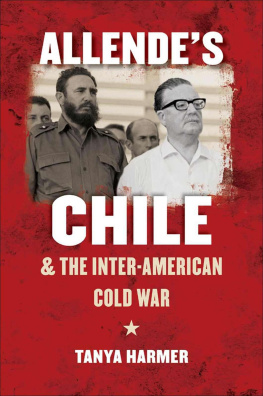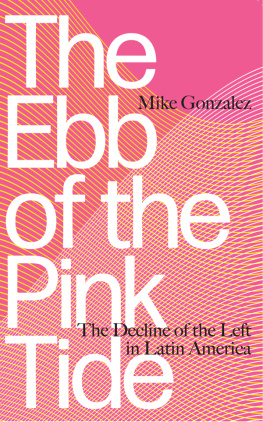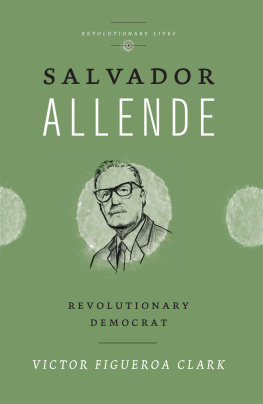ALLENDES CHILE
and the Inter-American Cold War
The New Cold War History Odd Arne Westad, editor
ALLENDES CHILE and the Inter-American Cold War
Tanya Harmer

The University of North Carolina Press
CHAPEL HILL
2011 The University of North Carolina Press
All rights reserved
Set in Arnhem & Franklin Gothic
Manufactured in the United States of America
The paper in this book meets the guidelines for permanence and durability of the Committee on Production Guidelines for Book Longevity of the Council on Library Resources.
The University of North Carolina Press has been a member of the Green Press Initiative since 2003.
15 14 13 12 11 5 4 3 2 1
Library of Congress
Cataloging-in-Publication Data
Harmer, Tanya.
Allendes Chile and the Inter-American
Cold War / Tanya Harmer.
p. cm.(The new Cold War history)
Includes bibliographical references and index.
ISBN 978-0-8078-3495-4 (hardback)
1. Latin AmericaPolitics and government19481980. 2. United StatesForeign relationsLatin America. 3. Latin AmericaForeign relationsUnited States. 4. United StatesForeign relations19451989. 5. ChileForeign relations19701973. 6.CubaForeign relations19591990. 7. BrazilForeign relations19641985. 1. Title.
F1414.2.H317 2011
980.03dc22 2011011686
To my parents, Anita and Jeremy
Contents
Maps and Illustrations
Maps
Chile
Downtown Santiago
Illustrations
Salvador Allende in Cuba
Cuban DGLN officers in Chile
Emlio Garrastazu Mdici and Richard Nixon in Washington
La Tribuna, 11 November 1971
Salvador Allende at the United Nations General Assembly
Salvador Allende in Moscow
Castro and Salvador Allende in Cuba
Cuban-Chilean strategy meeting in Havana
Acknowledgments
I am indebted to many people for their support and guidance during the many years that I have been researching and writing this book. First, I owe an enormous debt to Arne Westadmy graduate teacher, doctoral supervisor, mentor, and friend. His inspiration, warm encouragement, energy, and enthusiasm for history and learning have been invaluable to me. As a student and now a lecturer at the London School of Economics (LSE), I have also been incredibly fortunate to benefit from the exciting intellectual, research, and teaching environment of the International History Department, the LSEs Centre for Diplomacy and Strategy, LSE IDEAS, Arne Westads Wednesday afternoon Cold War Research Seminar, and the LSEs Latin America Research Seminar. Within this context, my particular thanks go to Nigel Ashton, Antony Best, Jeff Byrne, Steve Casey, Vesselin Dimitrov, Arne Hofmann, Artemy Kalinovsky, Ed Packard, George Philip, Kristina Spohr-Readman, Thomas Field, Victor Figueroa Clark, and Erica Wald, all of whom at one point or another read earlier portions of the book and offered helpful comments. I am also enormously grateful to Anita Prazmowska for helping me locate Polish documents that are referred to in this book while on sabbatical and then for spending hours translating them for me over coffee and baklava. The same goes for my former graduate student at the LSE, Laura Wiesen, who translated East German materials for me with great enthusiasm and professionalism. Without a doubt, the contents of this book are far richer as a result of the support and inspiration that the LSE has provided me with since I first arrived there as a rather nervous graduate student in 2001.
Beyond the LSE, I am profoundly grateful to Piero Gleijeses and to Jim Hershberg, who took the time to read the manuscript version of the book. Not only did they express interest and faith in the project, but they also offered detailed comments and insightful suggestions, which I have done my best to incorporate into the final version. Alfredo Riquelme, Joaqun Fermandois, and Fernando Purcell at the Pontificia Universidad Catlica (PUC) in Chile have also been incredibly supportive. For their advice and interest in my research, their collaboration in the LSE IDEAS Latin America International Affairs Programme, and their invitation to Chile during the spring of 2010, my thanks. Over the course of my research trips to Chile, I have also been warmly welcomed at Chiles Foreign Ministry Archives and assisted by its staff. My thanks therefore go to those who helped make my visits there so fruitful, and particularly to the archives director, Carmen Gloria Duhart. In Cuba, the process of research is as complicated as it is exciting, and it would have been far more daunting without the support and guidance of Antoni Kapcia, Hal Klepak, and members of the Cuba Research Forum based at the University of Nottingham and the University of Havana. For their help in obtaining the right visa, introducing me to the right people, and providing a welcoming environment to discuss research in Cuba, I am greatly indebted. In Havana, my thanks go to Jorge Hernndez and Luis Ren Fernndez at the Centro de Estudios Sobre los Estados Unidos at the University of Havana, the staff at Casa Memorial Salvador Allende, and Carlos Alzugaray at the Instituto Superior de Relaciones Internacionales. I am also grateful to others working on Latin American and U.S. history with whom I have enjoyed stimulating conversations and from whom I have received invaluable feedback and support, not least Andrew Preston, Jim Siekmeier, Vanni Pettina, Andy Kirkendall, Alessandro Santoni, Olga Ulianova, Eugenia Palieraki, Matias Spektor, Hal Brands, Andy Scott, and Kristian Gustafson. Over the years, I have also been pushed forward by the many insightful comments and questions about my research at various conferences and seminars in the United Kingdom, Chile, Italy, France, and the United States. To those who were there and whom I have not mentioned in person, thank you. For their help in the final stages of the writing process, I am also enormously grateful to Charles Grench, Beth Lassiter, Brian MacDonald, and Ron Maner at the University of North Carolina Press, and to Michael Taber, who took the time to help me improve the manuscript. Needless to say, any errors or mistakes that follow are entirely my own.
The research and years I have dedicated to this project would simply not have been possible without the generous financial assistance I received as a doctoral student from the Arts and Humanities Research Council (AHRC), the International History Department at the LSE, and the University of Londons Central Research Fund. In particular, the AHRCs doctoral scholarship and Study Abroad Grant allowed me to kick-start the project by funding extended research trips to Washington, Santiago, Brasilia, and Havana in 2004. The University of Londons Central Research Fund and the International History departments travel bursaries and staff research fund then provided me with funds to return to Washington, Cuba, and Chile over the course of the next six years to conduct further archival research and interviews. I am also grateful to the Institute of History at the PUC in Chile for having paid for my travel to and living expenses in Santiago over the course of my stay there as a visiting professor in 2010.
Last but by no means least, I would like to say a special thanks to my friends outside of the world of academia and to members of my family, who either read bits of the book, gave me their heartfelt support over the years, or both. Words are not enough to express the gratitude I feel toward them, and I would certainly not be where I am now without them. I would especially like to thank my sister Jessy, Mark and Claire Plumb, Katie Plumb and Ian Jasper, Lindsay Evans, Kate Annand, Erin OConnor, Javier Urrutia Denicola, Frederico Matos, the girls from 45 Ash Grove, and Tom Newman. Most of all, however, I would like to thank my parents, Anita and Jeremy, who not only endured the worst of a lengthy writing process with me but also made the best of it possible by opening my eyes to the world, encouraging me to discover it, and offering me love and support along the way.
Next page
